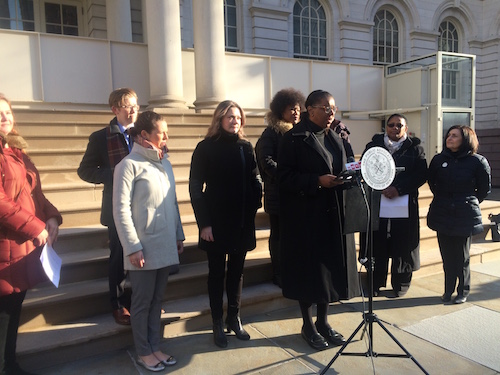Public Advocate Letitia James joined with Council Member Rafael Espinal Jr. (Bushwick, East New York, Ocean Hill-Brownsville) and advocates yesterday morning pushed for new legislation that will prevent employers from asking a job applicant for previous salary information, but the city’s largest business advocacy organization says the measure is an example of government over regulating the private sector.
James is hoping that this new bill will be able to close the wage gap between men and women when it comes to equal pay.

“In 2016, unfortunately women still do not receive equal pay for equal work. This law will be codified in the city’s human rights law and the Commissioner of Human Rights will ensure that employers abide by this new law or else face anything from compensatory damages to civil and criminal penalties,” said James. “The support we have received speaks for itself…including every woman in the City Council.”
According to Intro. 1253, the measure “will prohibit employers from inquiring about a prospective employee’s salary history during all stages of the employment process. In the event that an employer is already aware of a prospective employee’s salary history, this bill would prohibit reliance on that information in the determination of the salary.”
The bill was introduced this past August after James released a report that found that “women in New York City earn approximately $5.8 billion less than men in wages each year.” Following the report and introduction of the legislation, Mayor Bill de Blasio issued an executive order to ban salary history information from the public sector employment process.

“I strongly support this groundbreaking legislation of prohibiting perspective employers from inquiring about a person’s salary history,” said Council Member Darlene Mealy (Brownsville, Bed-Stuy, Crown Heights), Chair of the Committee on Civil Rights. “Far too long people, especially women and people of color have been unfairly discriminated against by using their salary history against them and have not been compensated for their true value. This legislation will combat this unjust practice which will allow people to be paid based on the merit of their credentials and not on the basis of their gender or race.”
Espinal said equity in pay is not just a white gender issue, but that Asian, Black and Hispanic women are also paid significantly less than their white colleagues.“Latinas in my district experience a 54% wage gap compared to white men and that is way too high. We must act proactively to ensure protection of women, minorities, immigrants and low-income people who feel threatened by the incoming national administration that for too long have been taken advantage by the current system,” he said.
James’ press conference included several small business owners in support of the measure, but it is doubtful that due to the size of their business they would be impacted much by the measure.
But the Partnership for New York City, which represents the city’s business leadership and its largest private sector employers, said the proposed bill infringes upon the “relationship between private employers and their prospective employees.”
The partnership submitted lengthy written testimony at yesterday’s city council hearing on the measure, that while well intended, doesn’t make sense in the highly competitive and increasingly global private sector.
“It is important to note that many of the city’s largest employers operate on a national, if not global, scale and addition of locally imposed regulation creates inconsistency across an organization. For example, Massachusetts recently enacted a law concerning salary history that is very similar to, but not the same as, Int. No. 1253. The Massachusetts law allows an employer to confirm an applicant’s salary history after an offer of employment has been made, whereas the city’s bill would prohibit asking about or relying on salary information at “any stage of the employment process,” the Partnership stated in its written testimony.
“The existence of different laws in different jurisdictions will add to the burden of compliance for private employers. New York City employers are increasingly frustrated by local government’s interference in their relationships with their employees when it comes to hiring, compensation and other workplace decisions. Employers see no recognition on the part of local government of the challenges and costs of compliance with dozens of new laws and regulations. The Partnership urges the City Council not to add to this burden by moving forward with this legislation.”
Last week, Philadelphia became the first city to ban salary history requirements on job applications.







